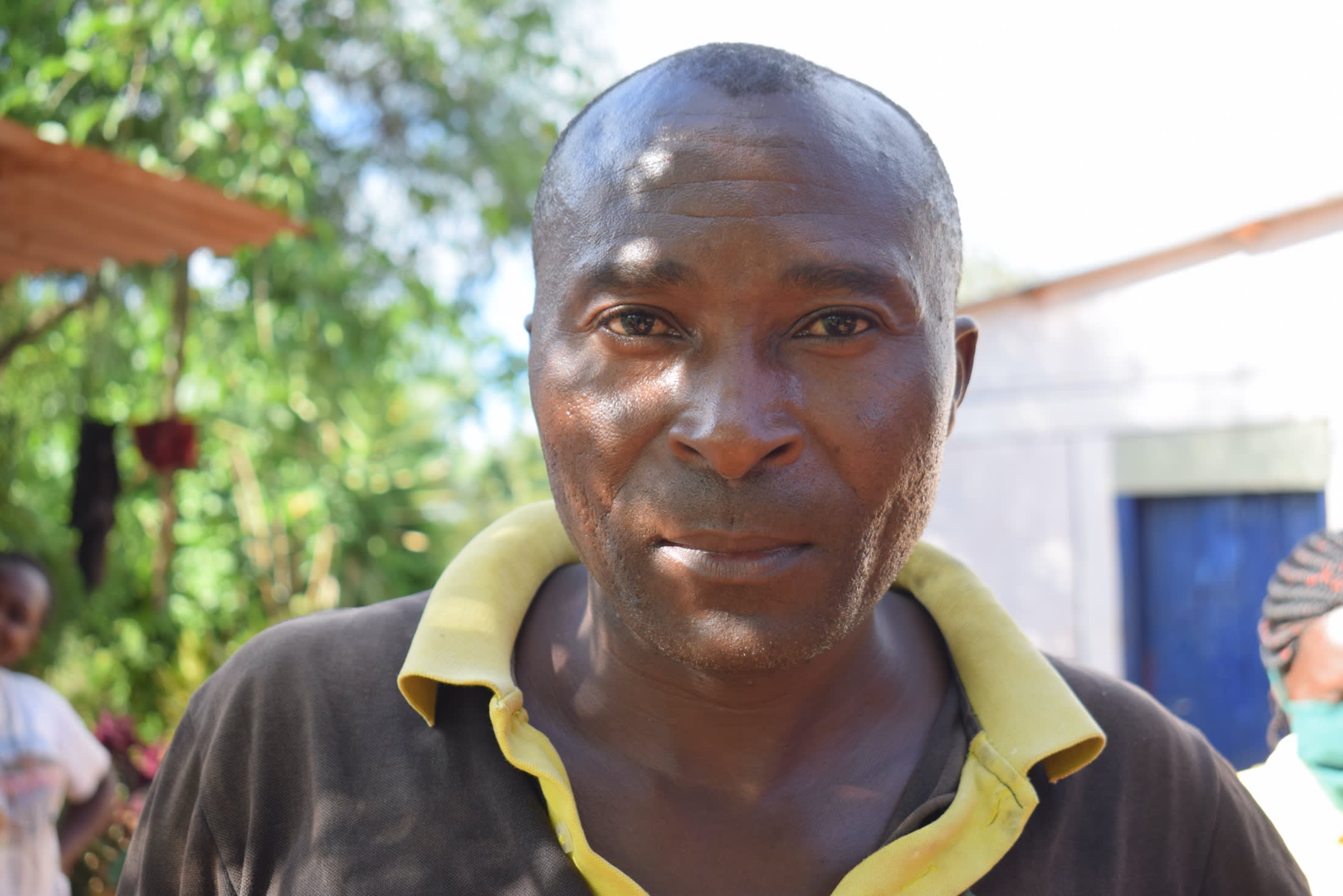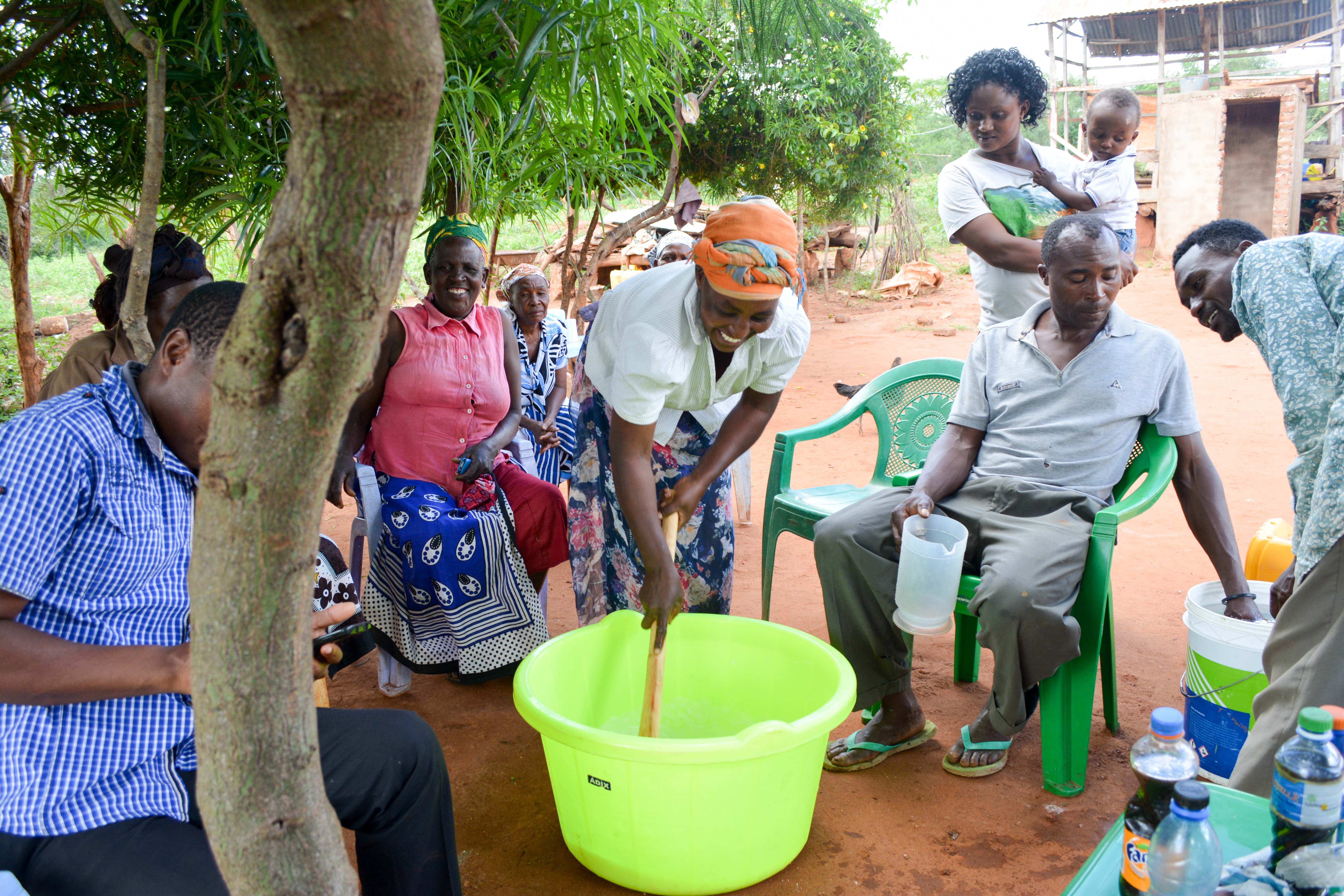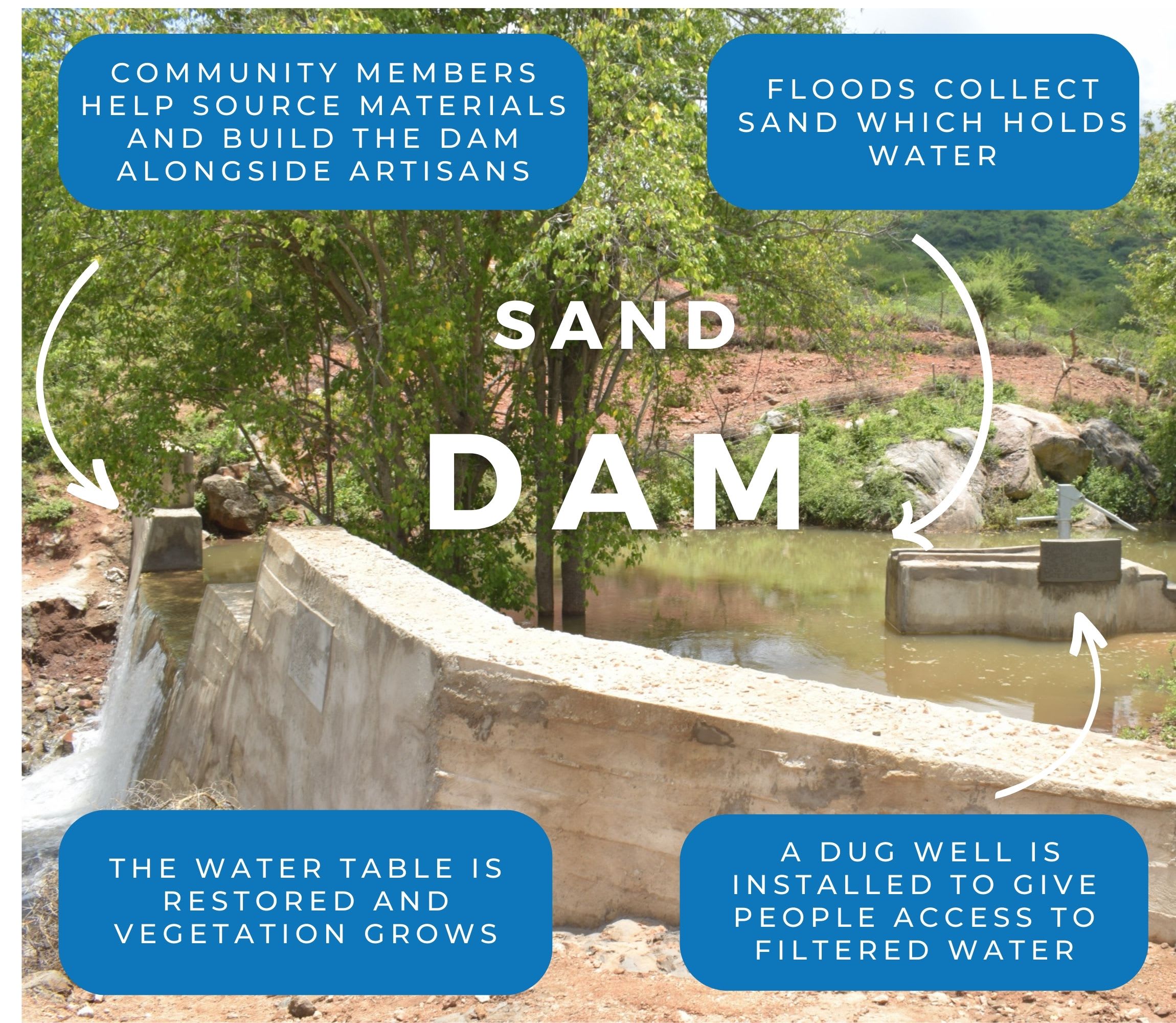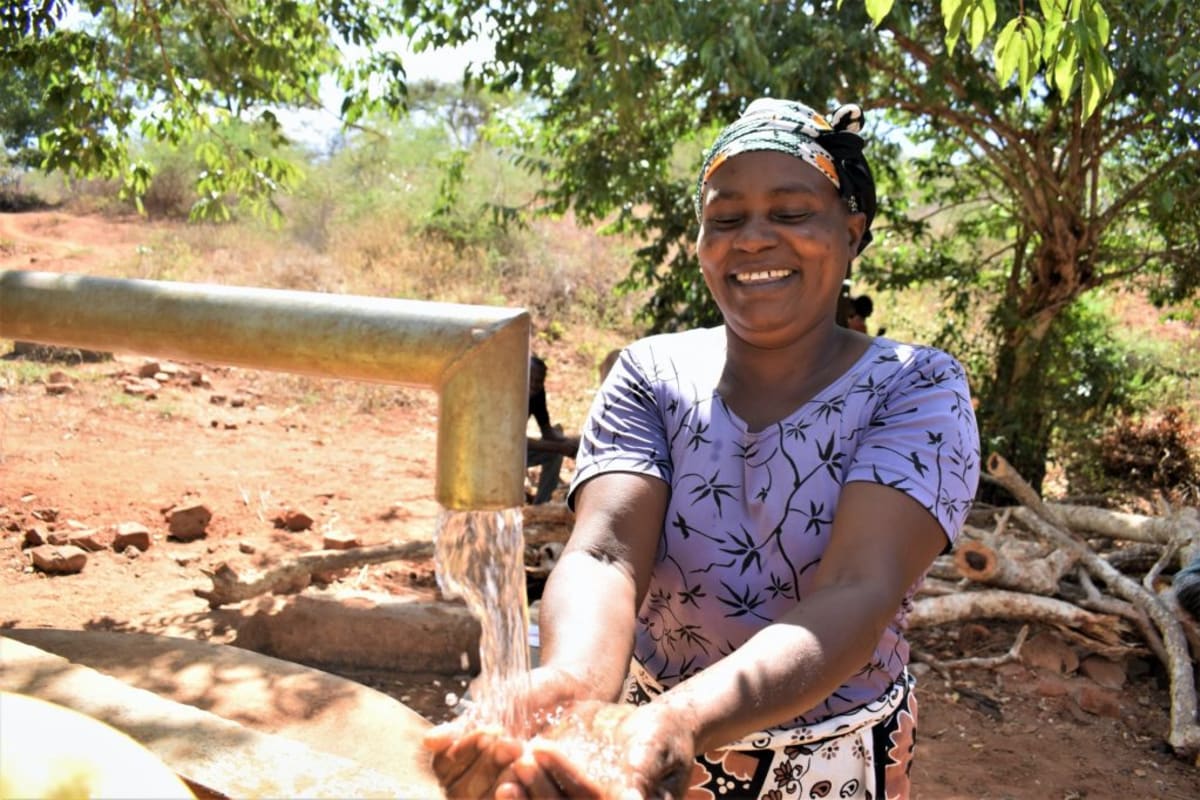Project Updates
August, 2020: Through Their Eyes: COVID-19 Chronicles with Bernards Wambua
This post is part of a new series by The Water Project meant to highlight the perspectives and experiences of the people we serve and how the COVID-19 pandemic is impacting them. We invite you to read more of their stories here.
Our team recently visited Syatu community to conduct a COVID-19 prevention training and monitor their water point. We checked in on the community and asked how the pandemic is affecting their lives.
It was during this most recent visit that Bernard Wambua shared his story of how the Coronavirus has impacted her his life.

Bernard Wambua
Our staff met Bernard outside his home to conduct the interview. Both our staff and Barnard observed physical distancing and other precautions throughout the visit to ensure their health and safety. The following is Bernard’s story, in his own words.
How has COVID-19 impacted your family?
“I have been working as a painter before the onset of this disease in our country. As a casual laborer, I would be called by clients to work on different projects frequently. There was a constant flow of cash, but now things have changed as there are no jobs. Schools were closed, and now we have to stay at home with our children and its expensive. We have to work extra hard on the farm to get food to feed the family. The harvests are good, but we are unable to sell the food products at the market because they were also closed in a bid to prevent the spread of Coronavirus.”
What steps is Kenya taking to prevent the spread of the virus?
“The Kenyan government has been giving various directives to the masses on how to conduct themselves during this pandemic. Through the available media outlets, they have been encouraging them to wash hands, social distancing by keeping a distance of one meter apart from each other, to wear masks, and to stay at home. There’s also a curfew that has been in place countrywide running from 7 pm to 5 am that has been efficient in controlling people’s movement. Counties that have recorded high cases of the virus have been on lockdown. There is no movement in and out of them to prevent the spread of the virus.”

Bernard and his family
Since the outbreak of COVID-19 in Kenya, has fetching water changed for you because of restrictions, new rules, or your concerns about the virus?
“Getting water has been very easy thanks to the sand dam water project. It takes less time to draw water from the well. At this time, when social distancing is highly recommended, we have been avoiding overcrowd at the water point as each person takes turns to fetch water. With our children at home, availability of water has ensured high maintenance of hygiene and sanitation, preparation of meals on time, and completion of house chores on time. We are no longer subjected to long walks at the water point, especially with the curfew in place.”
How has having a clean water point helped you through the pandemic so far?
“During this time, having a sand dam/ shallow well project is very vital because, in this region, we often face water scarcity challenges. Having a consistent supply of water is a great source of peace of mind because we need water to wash our hands, keep the households clean, perform chores, and prepare meals on time before the curfew. It has also helped in reducing movement, thus reducing possible exposure to the disease. We highly appreciate the support of The Water Project through Africa Sand Dam Foundation because our lives are far much better; our living standards are improved, especially during this pandemic. In addition to the sand dam project, the WASH Training that was conducted has been really helpful to us. Now we know the right procedures to follow when washing hands to prevent ourselves from getting sick. The skills of soap making have come in handy because we can make soap at home now and keep clean as we are not expected to go to the market places.”
How has getting food been at this time?
“We have been getting food from our farm as we have had very bountiful harvests during this period. The only challenge faced has been attaining the supplementary items which need to be bought from the market, such as wheat flour, sugar, salt, among others. Availability of water from the sand dam project has also enabled us to establish a vegetable garden in our compound where we have planted kales, spinach, and tomatoes.”

May, 2020: COVID-19 Prevention Training Update at Syatu Community
Our teams are working on the frontlines of the COVID-19 pandemic. Join us in our fight against the virus while maintaining access to clean, reliable water.

We are carrying out awareness and prevention trainings on the virus in every community we serve. Very often, our teams are the first (and only) to bring news and information of the virus to rural communities like Syatu, Kenya.
We trained community members on the symptoms, transmission routes, and prevention of COVID-19.
Due to public gathering concerns, we worked with trusted community leaders to gather a select group of community members who would then relay the information learned to the rest of their family and friends.
We covered essential hygiene lessons:
- Demonstrations on how to build a simple handwashing station
- Proper handwashing technique
- The importance of using soap and clean water for handwashing
- Cleaning and disinfecting commonly touched surfaces including at the water point.
We covered COVID-19-specific guidance in line with national and international standards:
- Information on the symptoms and transmission routes of COVID-19
- What social distancing is and how to practice it
- How to cough into an elbow
- Alternative ways to greet people without handshakes, fist bumps, etc.
- How to make and properly wear a facemask.
During training, we installed a new handwashing station with soap near the community’s water point. We also met Bernard Wambua. He told us about how his family is impacted by COVID-19.

Bernard Wambua
"We have been getting food from our farm as we have had very bountiful harvests during this period. The only challenge faced has been attaining the supplementary items which need to be bought from the market, such as wheat flour, sugar, and salt, among others," he said.
"Availability of water from the sand dam project has also enabled us to establish a vegetable garden in our compound where we have planted kale, spinach, and tomatoes.”
Go here to see what else Bernard had to say and the impact of COVID-19 on other families in the region.
Due to the rampant spread of misinformation about COVID-19, we also dedicated time to a question and answer session to help debunk rumors about the disease and provide extra information where needed.
Water access, sanitation, and hygiene are at the crux of disease prevention. You can directly support our work on the frontlines of COVID-19 prevention in all of the communities we serve while maintaining their access to safe, clean, and reliable water.

October, 2019: Giving Update: Syatu Community
A year ago, your generous donation helped Syatu Community in Kenya access clean water.
There’s an incredible community of monthly donors who have come alongside you in supporting clean water in Syatu. Month after month, their giving supports ongoing sustainability programs that help this community maintain access to safe, reliable water. Read more…

December, 2018: Syatu Community Sand Dam Project Complete
Syatu Community, Kenya now has a new source of water thanks to your donation. A new dam was constructed on the riverbed, which will build up sand to raise the water table and naturally filter water. Community members also attended hygiene and sanitation training, and plan to share what they learned with their families and neighbors.
New Knowledge
Hygiene and sanitation training was planned by Mr. Muendo Ndambuki, the field officer for this region. Trainer Veronica Matolo worked with him to find the best date for the community. Once decided, the self-help group leaders went door to door to invite everyone.
There were 20 participants in all. We had to meet outside with such a large group, but we at least tried to find the shade under trees. As the day progressed, the sun kept moving so the whole group would move their chairs along with the shade. Though it was hot outside, participation was excellent; everybody was willing to learn and take part in every activity.
Trainer Matolo conferred with the field staff about their visits to households and interviews with community members to determine which topics still needed improvement. They decided to train on:
- cleaning latrines
- water treatment
- waste disposal
- how diseases spread
- how to make soap

The community members really benefited from water treatment discussions. We reviewed the different treatment methods, how water gets contaminated in the first place, and the importance of treatment before drinking. Participants confessed that when the water looks clear, they don't bother treating it in any way. Clear water doesn't always mean it's safe for drinking!
Everyone enjoyed learning to make soap. Community members said this soap recipe would bring in extra income. They'd make enough for their families and then sell the excess to their neighbors.
Trainer Matolo also brought out the action plan Syakama Self-Help Group had written during the last training. They went through item by item, determining how far everyone has come towards reaching their goals. Most of these goals pertain to household hygiene, as group members are trying to realize full latrine coverage, handwashing stations, dish racks, and other important facilities.
"This training has been done to us several times and we are very much grateful for the efforts that are always made to ensure that we get the content," said Mrs. Sarah Muthiani.
"It has been of great importance making a tremendous change in our lives because since the first day when the training was done to us, we have improved our hygiene at the personal level and we will keep it at that level because we don't want to be sick."
Sand Dam
"Syakama Community is happy to have completed this project. It is a project that will be here for us and generations to come. We are proud of the project as it will come with great impact in terms of water access within our locality," said Mrs. Muthiani.
"Water will now be available in adequate amounts as compared to the past."
The only challenge building this sand dam was that group members like Mrs. Muthiani had to work extra hard alongside our team. All self-help group members are expected to work together on such a large-scale project, but some made excuses to stay on their own farms all day. Mrs. Muthiani and many others made this project a success.
The Process:
The community members collected all of the local materials like rocks and sand that were required for successful completion of the dam. They also provided unskilled labor to support our artisans. The collection of raw construction materials takes longer than the actual construction. For a super large sand dam, materials collection could take up to four months.

While we delivered more expensive materials like the cement, lumber, and work tools, community members gathered sand, stones, and water.
Siting and technical designs were drawn and presented to the Water Resources Management Authority and a survey sent to the National Environment Management Authority for approval before construction started. Once approved, we established firm bedrock at the base of the sand dam wall. In the absence of good bedrock, excavation is done up to a depth at which the technical team is satisfied that the ground is firm enough to stop seepage.

Then mortar (a mixture of sand, cement, and water) is mixed and heaped into the foundation. Rocks are heaped into the mortar once there is enough to hold. Barbed wire and twisted bar are used to reinforce the mixture. Once the foundation is complete, a skeleton of timber is built to hold the sludge and rocks up above ground level. The process is then repeated until a sufficient height, width and length are built up. The vertical timber beams are dismantled and the dam is left to cure.
As soon as it rains, the dam will begin to build up sand and store water. With this water, the surrounding landscape will become lush and fertile.

It could take up to three years of rain (because sometimes it only rains once a year!) for this sand dam to reach maximum capacity. It is 29.3 meters long and 2.25 meters high and took 430 bags of cement to build.
Sand dam construction was undertaken simultaneously with the construction of a hand-dug well that will give community members a safe method of drawing water. As the sand dam matures and stores more sand, a huge supply of water will be available for drinking from the adjacent hand-dug well.
To see that hand-dug well, click here.

July, 2018: Syatu Community Project Schedule
It won't be long now before the construction of the sand dam begins. As you can imagine, coordinating all of the people involved in this kind of project is the key to success. The field officers meet frequently with the community to verify that all the materials and volunteers are ready. They need to prepare accommodations for our artisans, too. Based on their last meeting, the community has decided that they need a few more weeks to prepare. We've adjusted the expected completion date for this project, and we look forward to keeping you updated as the artisans and trainers get to work in the coming months!
May, 2018: Syatu Community Sand Dam Underway
A clean water shortage around Syatu Community still affects hundreds of lives, draining time, energy, and health. Thanks to your generosity, we’re working to install a clean water point and much more.
Get to know this community through the introduction and pictures we’ve posted, and read about this water, sanitation and hygiene project. We look forward to reaching out with more good news!


 Sand Dam
Sand Dam
 Rehabilitation Project
Rehabilitation Project


































